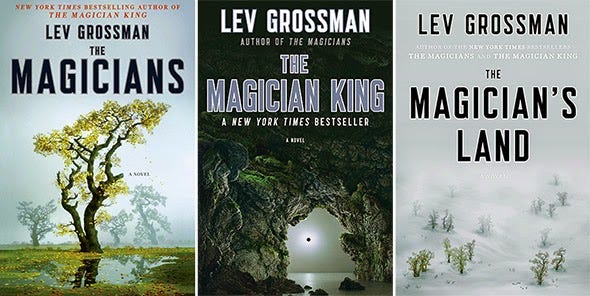I just finished rereading The Magicians trilogy by Lev Grossman, one of my all-time favorite book series. It’s like Harry Potter for grown-ups—highly recommended!
One of the many beautiful lessons the books impart is something like: If you don’t design your own life, others will design it for you. You are constantly being molded by the expectations of others, and if you let yourself drift along unconsciously, you’ll eventually realize you’re living a life that you never really chose. You are like a jigsaw puzzle piece that is being shuffled around by society trying to find the existing gap it fits into.
But as you start to make more conscious decisions about what you want and to live your life accordingly—in other words, when you become more yourself—you become a more jagged puzzle piece. You will have drives that are truly your own, opinions that are truly your own; it will be harder to find the gap that fits your increasingly unique shape.
Some people naturally find one, maybe among a cohort of friends at a workplace where they spend their entire career, or in a Church community, or with extended family. Most people, sadly, never do. But a very small few are able to build a puzzle around their piece’s shape.
Here are some personal examples of the ways I’ve tried to build my own world. (These three dimensions are often the focus of someone’s life; I am advocating for more deliberateness—and willingness to make tradeoffs—in each of them.)
1. Partner
It’s much easier to build a world with a cofounder!
Since the early days of our adulthood, my wife Charlotte and I have talked virtually every day, supported each other through difficult times, championed each other’s moonshot ideas. (As I used to say when Charlotte was studying organic chemistry before medical school: “I want to be the catalyst to your dreams, not the inhibitor!”) Every success or piece of happiness in my life is thanks to Charlotte, and vice versa.
I think dating is like a massive treasure hunt: the prize (your ideal partner) is hiding somewhere, and you need to find it. If finding someone to share your life with is important to you, then this treasure hunt is the most important thing you are doing. It may be worth spending as much time on as you spend at your job—and approaching it with the same amount of energy and proactivity.
I’ve been told many times that “people in their twenties aren’t thinking about marriage nowadays; it feels so far away for them, it’s not a priority for them.” Yet, every person I know in their 30s who is single has told me that the dating pool was much better in their 20s and they wish they had taken it more seriously. Suddenly, it seems to them that the best catches have been taken, and friends who previously had time for them are now consumed with raising children, and they are the “last one standing,” holding the bag, wondering how everyone disappeared so quickly.
If you think that you never want to marry—great! You should decide for yourself what’s important, and not make a life choice simply because it’s what most people do. But if you suspect that you one day want to find a life partner, pretend that day is today. Because it may take one year to find that person, and it may take twenty years.1
2. People
Everyone craves a sense of belonging. I define a community where I belong as: “the more myself I act, the more the people here love me.”
That is particularly true of my best friends: my childhood friend Daniel married my wife’s best friend Julie (their first kiss was at our engagement party). Now they, like us, have little kids. We long harbored a dream of living side-by-side in neighboring houses, sharing meals and movie nights and effectively raising our children together. We tried to make it work multiple times, but were always thwarted by reality: Daniel was tied to a specific location to commute to his job, while our priority was being closer to the ideal school for our kids. The housing market conditions made it difficult to find one house we liked, let alone the chances of two side-by-side happening to come up at the same time, within budget constraints that worked for each of us.
Years passed. Then, in what felt like an act of fate, I happened to find out about a new townhome development a few days before they went on sale. Daniel and Julie visited the model home and told us they were considering it. I flew down the next day (for one day only—quite stressful!) and after walking through it, had basically one hour to decide if we wanted to buy it. What Charlotte and I agreed on was essentially: “This is not the right house for us. It’s too small, it has lots of staircases (not good for little kids), it’s in a city that meets almost none of the criteria we had for an ideal place. And yet… all of those reasons pale in comparison to the opportunity to share a life with our best friends.” So we bought the house next to theirs.
Since then, we have seen each other nearly every day; our children are a part of each other’s lives, as are we.
Of course, going all-in may not be the right move for everyone—and you have to truly, deeply trust your friends to make it worth these sacrifices. I simply think that, if you have found the people who truly “get you” in life, those sacrifices are eminently worth it.
3. Career
From an outside view, my career trajectory makes no sense. I went from management consulting to EdTech startups to running a community of leaders from around the world. Somewhere in between, I created and taught the course Adulting 101 at Boston College. There was no linear path, no one credential that helped me climb to the next step. Rather, I evaluated each opportunity on its own merits, and pursued the ones that fit my superpowers.
A superpower is something that:
You are better at than your peers (in the top 5%)
You like to do
You value getting better at (i.e., you respect someone who is really good at it)
I’ve observed that the most successful people in the world are not the ones who force themselves into a box of “what this job requires” nor force themselves to get better at the things they are not naturally good at. Rather, they are the ones who take (and shape) a role that enables them to spend as much of their time and energy as possible using their superpowers.
Discovering your superpowers is a lifelong journey filled with plenty of revisions as you learn more about yourself. But as a starting point, you can do a brief reflection exercise:
What recent projects at work did you really love?
When you last received high praise, what was it for?
What accomplishments (at work, at school, or in life) are you most proud of? What skills/qualities enabled you to accomplish them?
When you leave the room, what do you hope people will say about you?
What do the people who most love you in the world love you for?
Every 6 months, you can come back to these questions and answer them anew, then revise your list of superpowers accordingly.
Looking back at most of my life, especially my childhood, I always felt like I was in a place where I never fully belonged. Now, I have an extraordinary life partner, a community of people including best friends next-door, and a career that has been entirely DIY. I created the world in which I belong.
Of course, it wasn’t all sunshine and roses every step of the way. What I gained in independence I traded for nearly-constant uncertainty about the future, and sometimes isolation. I don’t think it’s easy, but I do think it’s possible for everyone to create their own world.
I hope these tips can start you on your journey… The first step of which is to stop trying to cram yourself into the right jigsaw puzzle—to embrace your unique edges, no matter how jagged, and build a life full of the people who see that jaggedness for what it is: beautifully you.
But how do you know when to commit? And how to not end up with the wrong person? These are fantastic questions, and beyond the scope of this post—I address them in detail in my forthcoming book.







